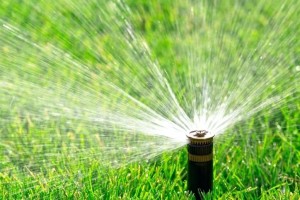As the first day of summer approaches, your thoughts might turn to keeping your home cool. Is the air conditioner working? Should we finally build that pool? While you, and your family, should always be your first priority, your garden can suffer from the heat too! Hot weather can be equally hard on your plants and, just like us; they will need some special attention when the heat gets to be too much. Don’t sweat the details though, Organically Green Horticultural Services is here to help with some advice you can use to protect your plants on even the hottest of days.
When to Water?
Like humans, or any living organism, water is crucial when trying to beat the heat. It may be obvious that plants need water, but how much water they actually receive could vary based on when you water! Watering plants midday, when the weather is at its hottest, is inefficient. A lot of the water meant for the plants will evaporate in the hot sun before they reach the roots. Watering in the morning or early evening will maximize your water efficiency, meaning every drop reaches the roots as intended. You should try to water your lawn or garden in the morning or early evening two or three times a week. With the extended daylight it should be easier to plan a scheduled watering.
Don’t Drown Your Daisies
Exposure to the sun and heat will cause a plant to wilt. The wilting comes from a process called transpiration; when a plant releases moisture to protect itself from excessive heat. The leaves wilt to minimize the surface area exposed to the sun. Some may believe wilting is the result of under watering but you should be able to see the plants recover when the sun sets. If you attempt to water your garden or lawn more frequently to counteract the wilting you might end up overwatering. Overwatering can lead to fungal diseases or root rot which will rob the roots of the oxygen it needs.
A Mountain of Mulch
Applying a thick layer of mulch will help insulate a plant’s root system from both the heat and cold. If your garden experiences extreme temperatures, we suggest at least 4-6 inches of mulch. Straw, pine needles, glass clippings, or even leaves make an acceptable basis for mulch. Mulch can also keep the soil in your lawn or garden moist.
Throw Some Shade
Over exposure to the sun can be damaging to plants much in the way it is to humans. Instead of sunburn plants can suffer from “sun scald”, which is damage to a plant’s tissue caused by exposure to excessive sunlight.
If the temperatures reach the 90’s plants will start to simply focus on survival, meaning plants like eggplants or peppers will stop flowering.
Both these issues can be resolved by placing some shade over the plants during the hottest part of the day. A simple patio umbrella or a bed sheet will be enough to protect your plants, just make sure you have them covered.

